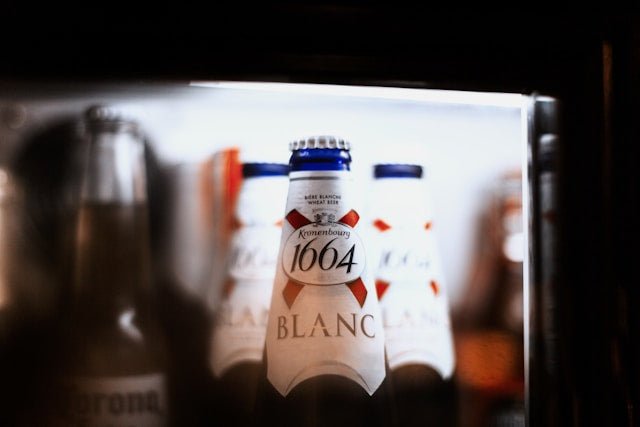
The Ultimate Guide: Does Beer Expire?
Today, we're on a mission to unravel one of the enduring mysteries of the brewing realm: Does beer expire? Join us as we dive deep into the science behind beer expiration.
If you've ever eagerly anticipated cracking open a beer only to find it doesn't quite hit the mark, you're not alone. Discovering the secrets to maintaining beer freshness can elevate your drinking experience. So, let's delve into whether beer truly "goes bad," effective storage methods to extend its lifespan, and how to gauge the age of your brews.
Does Beer Expire?
Yes, beer can indeed expire. However, it's more nuanced than a simple "gone bad" scenario. Pathogens can't thrive in beer, so from a health perspective, it doesn't spoil. Yet, factors like age and temperature significantly influence its taste. While some beer styles retain freshness better, many brewers excel at slowing flavor aging. Nonetheless, fresher beer generally translates to a better taste experience.
Certain beer varieties, like hop-forward IPAs, peak within months of packaging, while heartier styles such as stouts and barleywines mature gracefully over time. Yet, enjoying hop-centric brews promptly is essential to preserve vibrant flavors.
Numerous factors impact beer freshness, with storage conditions playing a pivotal role. Exposure to light, heat, and oxygen accelerates aging and fosters off-flavors. Hence, storing beer in a cool, dark environment away from sunlight and temperature fluctuations is crucial. Additionally, pasteurization affects shelf life, with pasteurized beers typically lasting longer due to reduced microbial activity.
Recognizing spoiled beer is key to an enjoyable drinking experience. Signs include off-putting flavors, unpleasant odors, excessive cloudiness, and over-fizziness.
Maintaining Beer Freshness: Key Strategies
1. Check Dates: inspect packaging for expiration dates.
2. Proper Storage: Keep your brew cool, dark, and shielded from temperature swings.
3. Consume Fresh: Prioritize hop-forward brews for prompt enjoyment.
4. Cellar Aging: Experiment with aging higher-alcohol brews in a cool, dark cellar.
While beer expiration dates indicate peak taste rather than safety, oxidation may alter flavor and body over time. Refrigerated, unopened beers can endure several years, contingent on style and ABV.

How to Store Beer
Maintaining beer in a refrigerator, between 38 and 50 degrees Fahrenheit, extends its life. Contrary to common belief, temperature fluctuations between fridge and room temperature don't spoil beer; sunlight exposure is the culprit behind skunkiness. If fridge space is limited, storing beer in a cool, dark place like a basement or closet is a viable alternative.
Crucial Factors: Oxygen, Heat & Light
Oxygen, heat, and light are beer's main adversaries, causing flavor deviations. Oxygen interacts with malt, yeast, and hops compounds, leading to oxidation and undesirable flavors. Even with advanced packaging techniques, minimal oxygen exposure is inevitable, exacerbating flavor changes over time.
Heat accelerates oxidation, necessitating refrigerated storage. Major temperature shifts, like from cold to hot environments, exacerbate flavor degradation irreversibly. Light sensitivity, particularly to UV rays, contributes to "light-struck" flavors, prompting the use of dark bottles to mitigate this effect.
Certain beers fare better over time, with hop aromas being particularly time-sensitive. For IPAs, adhering closely to "drink-by" dates ensures optimal enjoyment. Conversely, maltier beers with higher ABV content develop richer flavors over time, offering greater longevity.
FAQs About Beer Expiration
Addressing common concerns offers peace of mind regarding beer shelf life:
Is Beer Okay After Two Years?
Properly stored beer can last up to two to three years post-expiration, especially when refrigerated.
Can Unopened Beer Go Bad?
Unopened beer may experience taste degradation after four to six months at room temperature.
Can Unopened Beer Mold?
Unopened beer rarely molds unless the bottling process is flawed.
How Can You Tell If Aged Beer Is Bad?
Look for changes in color, smell, taste, foam density, and overall appearance.
Can I Use Expired Beer for Cooking?
Expired beer is usable in cooking, but watch for noticeable off-flavors.
Can Beer Go Bad if Resealed?
Once opened, beer begins to oxidize, altering flavors. Resealing slows this process, but consume within a day or two for optimal taste.
How to Maximize Shelf Life?
Store beer in a cool, dark place away from temperature fluctuations and direct sunlight to prevent flavor deterioration.

Beer Aging and Expired Beer
Nearly every beer displays a date indicating how long it will maintain its intended taste, assuming proper storage. While some beers develop complex flavors over time, aging beer is not suitable for all varieties. Barleywines, Imperial Stouts, and similar high-ABV, dark malt beers are excellent candidates for cellaring, while hop-forward styles like IPAs and Pale Ales are best enjoyed fresh.
Handling Expired Beer
Discovering an old beer prompts a moment of contemplation. Despite exceeding its recommended shelf life, the beer remains safe to drink in most cases. However, noticeable changes like loss of fizz or off-flavors warrant disposal. Although beer expiration doesn't pose health risks, taste quality can decline over time.
Detecting Spoiled Beer
Recognizing spoiled beer ensures a pleasurable drinking experience. Off-flavors, aromas, or excessive cloudiness signal beer past its prime. Preventing unfavorable flavor changes involves vigilant storage practices, minimizing exposure to oxygen, heat, and light.
Maintaining beer freshness is an effort. By adhering to optimal storage practices and consuming beers close to their packaging date, enthusiasts safeguard the integrity of their favorite brews. So, here's to enjoying beer at its finest, respecting the craftsmanship of the brewers who bring us these delightful libations.
